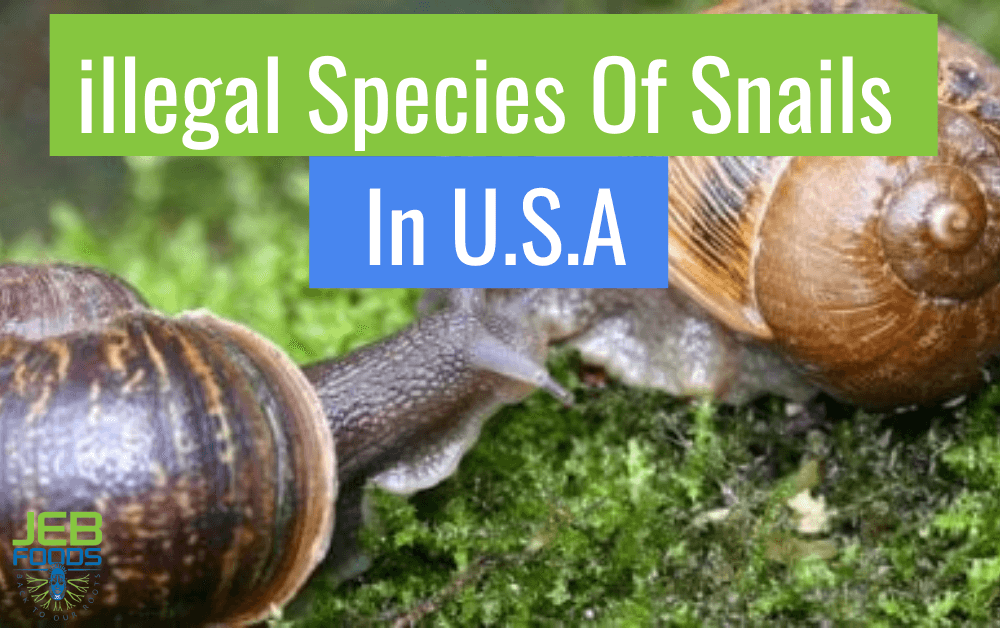There are various species of snails, but the Achatina species is illegal in the United States and prohibited explicitly for both interstate movement and importation
Snails are tiny, shelled organisms that play an essential role in the ecosystem.
Snails are considered a delicacy and an excellent source of nutrients in several parts of the world, and they are also helpful to health.
However, 95 percent of snail species can be harmful, prohibited in most nations? The question then becomes which snails are illegal in the United States and not.
Well, I’d want to discuss the risks of snails, as well as why they’re forbidden and illegal in the United States of America.
Get the Full detail of the major differences between slugs and snails
Are Snails Banned In The U.S.
Table of Contents
ToggleYes, snails of the species Achatina, such as the Giant African Snail, are prohibited from both movement and importation into the United States.
The Giant African Snail harms both humans and plants, and the Agriculture Department has issued a warning. Which triggered the ban on snails
According to the USDA, more than 200 snails were captured from a citizen in Long Island, New York, leading them to Georgia’s seller.
The U.S. Department of Agriculture raised concerns to the dealer and confiscated around 1,000 other snails in Georgia, Indiana, Pennsylvania, and New York.
Furthermore, if this species is discovered, it is protected, and severe measures are taken against the individual who has taken possession of it (if found in possession of someone).
According to the laws of the United States, it is prohibited to import live snails into the country for human consumption, except for snails used for food.
However, It is possible to import snails that have been boiled, frozen, or processed.
Why Are Some Snails Illegal
Snails are known to cause harm to crops and vegetables, consequently lowering the quality of food available in the country.
The majority of snails have been declared illegal because they cause the degradation of structures, the pulverization of crops, and the transmission of meningitis to humans.
Despite this, most people still consume the disgusting invaders, and some snails carry a severe parasite known as rat lungworm.
However, according to estimates, several children have ended up in the hospital after being enticed to consume raw snails.
Snails are not authorized to be imported into the United States because they threaten to become a successful invasive species and become a severe agricultural pest.
Exotic snails can be highly invasive, causing havoc on agriculture, human health, and biodiversity.
Even though they are sluggish in moving, they can spread extensively by stowing away plants and transporting products.
Exotic snails, especially giant African snails, are likely to escape and spread in the United States,
Thereby, causing issues for many sorts of plants and the environment, snails from other countries, including gigantic African snails, are forbidden.
Here is the complete Information about a snail
What Are The Illegal Types Of A Snail
The most popular illegal snail is Achatina fulica, the enormous African snail or the giant tiger land snail. It is a kind of vast, air-breathing land snail.
Giant African snail (Achatina Fulica) has a large and broad diet preference; the dietary habits of this species cause a high loss in crops for farmers.
Another snail on the list is the golden or channeled apple snail, a highly invasive freshwater snail that has already spread worldwide (Pomacea canaliculata).
These species of snails are exceptionally restricted and unlawful for both interstate travel and importation into the United States.
As a result, it may cause havoc in rural and urban places. Although the Giant African Snail prefers tropical and subtropical climates, it may also survive mild and frigid climates.
It can also thrive in a warmer climate, where it may multiply quickly. Every year, each snail may lay around 1,200 eggs.
As an invasive species, this snail risks both people and plants alike. This snail species group is banned from entering the United States, but it is also protected when it is identified.
Why Are Giant Snails Illegal In The U.S.
Many African countries, particularly West Africa, consider the giant African land snails (Archachatina marginata, Achatina achatina) delicacies.
Giant African snail reproduces quickly, producing about 1,200 eggs in a single year.
The giant Africa snail is one of the most destructive snails on the planet, feeding on the minimum 500 different plant species, including peanuts, most bean, pea kinds, cucumbers, and melons.
The giant African snail (G.A.S.) is prohibited from being imported or owned by the United States Department of Agriculture because it poses a massive threat to agricultural and human health in the country.
Because of this, it is expected that certain governments may regard them as threats to their survival.
The following are the main reasons the state department of agriculture has banned giant land snails in the United States.
They Are Carriers Of A Parasitic Nematode
The African snails contain a parasitic nematode that may be a vector for meningitis in people, which can be highly harmful to one’s health.
The snail is an intermediary host between the parasite and its natural end host, a rat.
There is no risk of getting meningitis from eating snails if they are appropriately cooked and not raw or undercooked.
Giant Snails Are Highly Destructive And Invasive.
These snails can consume practically anything they come across, which means that if they manage to make their way into a farm, they may wreak havoc on the crops there. They can even ruin the entire field of crops.
A gravid snail can lay hundreds of eggs due to male and female reproductive organs in this species, which enhances the impact of their onslaught.
It is challenging to eradicate them since they may quickly develop a new colony of their own.
After the second invasion of giant African land snails, the state of Florida was still battling back.
After the first African giant snail invasion in Florida was found in the late 1960s, it is estimated that it took ten years and millions of dollars to eliminate the infestation.
However, for the first time in decades, the United States is taking proactive measures to prevent another invasion in all fifty states.
It is believed that Giant East African snails are the snails with the most possibility for devastation. Considering that they consume many plants, they are a significant pest of agricultural and gardening crops.
However, this is the primary reason why East African snails are included on the list of the top 100 invasive organisms that are forbidden in the United States, which includes
Yes or No! Can Edible snail cause illnesses?
They Eat A Wide Range Of Items
In addition to eating agricultural and horticultural crops, it has been claimed that these giant African land snails graze on stucco to remove it off walls.
One would question why these snails eat the stucco on the walls of buildings, but upon further consideration, the lime may serve as a source of calcium for them.
They require calcium as a nutrient for constructing their shells, and eating stucco is a suitable supply for them.
Is Eating Snails illegal in the U.S
No regulation or law prohibits you from consuming dried, frozen snails as part of your routine.
It is lawful to import frozen edible snails for food in the U.S., and edible snails are legal and available in some regions of Europe, as well as other foreign nations,
Most supermarkets have canned snails, chopped, diced, and dried frozen snails suitable for eating.
These are the health benefits of Edible snails
Are Garden Snails Illegal In The U.S.A
A garden snail is one kind that was brought to the United States for human consumption.
According to the legislation, the Department Of Agriculture does not approve the importation of edible snails for breeding purposes.
Moreover, USDA does not even allow the transfer of these snails from one state to another.
On the other hand, the USDA permits the restricted importation of certain snail species with a verified license.
In addition to federal laws, a few states have rules governing any agricultural pest or edible snail movement into that state.
Snails, including edible ones, are considered invasive species by the USDA, and as a result,
There are specific limits for what may and cannot be done with them, and they must be followed strictly.
Because each state has its policy regarding snails as a nuisance, state regulations might differ from one another.
Although edible snail species and cultivation have been discovered in several US states, it is a good idea to verify with the state’s agricultural authority first before taking any action.

Are Milk Snails Illegal In The U.S.A.
People frequently ask me this question, and my answer remains the same.
Yes, the USDA and APHIS do not consider milk snails an illegal import. However, they have rules for individuals attempting to bring this snail into the United States.
Because the milk snail is edible, local chefs may gather these invasive snails and incorporate them into their menus.
In this approach, the restaurant provides a delicacy while also helping native snail species survive.
Milk snails (Otala lacteal) may be found in the wild in various southern states, which is why so many people keep them. Getting pet snails is as simple as catching wild snails.
In addition, they provide charts that show which species require permissions to be moved in certain areas. One of the endangered species is the milk snail.
Can You Own A Snail In The U.S.
In addition, many individuals wonder if snails are legal pets in the United States.
A Giant African Land Snail cannot be kept in the United States, as previously stated, due to a Department of Agriculture decision declaring them to be invasive.
It is also prohibited to keep them as pets in the United States.
Depending on the type of snails, a USDA authorization may be required.
Land snails make excellent pets for elementary-school-age children, who may learn a great deal by seeing how snails crawl, feed, develop and reproduce in their natural environment.
Some species of land snail are illegal to possess in the United States; pet stores carry a variety of land snail species that are perfectly legal.
Get the Full detail of the most beautiful snails in the world
Can You Raise Snails In The U.S.
There are very few snail farms in the United States, and the USDA does not approve the sale of live snails and raising snails over state lines in the United States.
It is unlawful for farmers to import live snails for human consumption, which has been a challenge for American chefs who want to serve their customers.
Every year, the demand for fresh snails (escargots) at restaurants in the United States grows, and snail farmers are trying to keep up with the need for their products.
The global market for wholesale snail sales is worth around $117 million per year in terms of value, making it one of the most profitable niche businesses to enter.

Is It Legal To Buy Snails Online In Us
Absolutely no, bringing live plant-feeding snails or slugs into the United States from Europe or elsewhere is unlawful, regardless of what a vendor claims.
Unless you have PPQ 526 permission, you are not permitted to purchase snails or slugs in the United States lawfully,
Anyone outside of the United States who claims that it is permissible to send you snail mail is either lying or uneducated about the laws in their own countries.
In the United States, importing snails from another nation is against the law and may result in legal repercussions, including penalties.
It is against the law in the United States to transfer snails or slugs that feed on plants over state borders.
Bringing live snails or slugs into the United States from foreign nations without permission is likewise prohibited.
According to the USDA, certain snails can be lawfully transported over state borders since they are tree snails that do not graze on plants or crops.
Final Thought
Snails contain many nutrients beneficial to humans, yet they may also be hazardous to one’s health and the environment.
well, based on my experience as a farmer who has been into heliculture transporting snails from one country to another for business
With no doubt that snails are highly prohibited and proclaimed an illegal creature due to their effect on the environment and human health
However, from my perspective, you should seek a rightful permit from the united state department of agriculture if you are looking to transport and raise snails for commercial purposes.
Get here one of the best edible dried-freeze Giant African snail here




